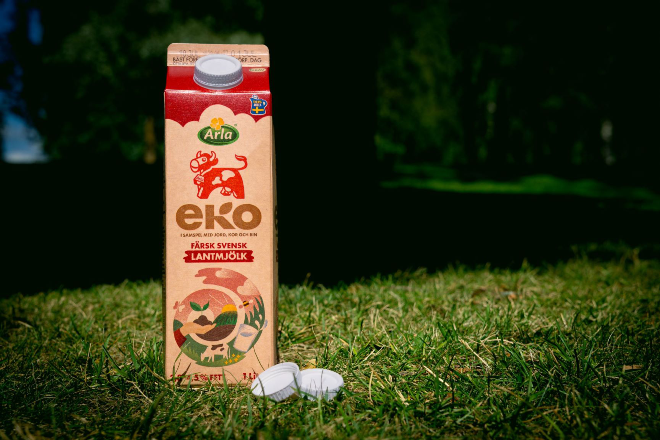Arla Foods is teaming up with Blue Ocean Closures in a formal partnership to create a fibre-based cap for its milk cartons. This could be a first in the dairy industry and would reduce Arla’s plastic consumption by more than 500 tonnes annually if implemented.
The cardboard milk carton is a well-known classic in several countries and while the packaging has undergone several transformations over the years and is now a near-optimal choice in terms of food safety and sustainability, the time has come to completely rethink a small yet significant part; the cap.
Making up for around 23 per cent of the plastic used in Arla’s cartons, the farmer-owned dairy cooperative has now set its sights on the caps as part of its sustainable packaging strategy to eliminate use of fossil based virgin plastic in its packaging by 2030.
Said Peter Giørtz-Carlsen, Arla Chief Commercial Officer: “Improving our packaging, including reducing our use of plastic, is imperative to us and we know that consumers are also very invested in this area. This project to explore what could very well be the first fibrebased cap on milk cartons is very exciting and shows that we at Arla are constantly looking to improve and lead the transformation of sustainable packaging.”
Added Lars Sandberg, Blue Ocean Closures, CEO: “We are delighted to work with Arla, acting as a frontrunner to create a real difference in packaging sustainability. With increased fibre content, the solution will increase recyclability, starting in Scandinavia and paving the way for global change”.
Part owner of Blue Ocean Closures, ALPLA Group is involved in the technical development and Christian Zmölnig, Director Corporate Research, Development and Innovation, concluded by saying: “As part of ALPLA’s important strategic development in the circular economy, we see great potential in this collaboration between Arla and Blue Ocean closures”.
With funding from Arla Foods, the plan is now to develop a fully functional prototype and complete the testing phase by start of next year. With the cap responsible for approx. 23 per cent of the total plastic used for Arla’s milk cartons, it is natural to ask why the dairy cooperative is not removing the cap altogether. Arla did in fact do that on its Danish organic range back in 2020 but it was not without criticism from consumers unhappy with the loss of convenience. For more visit arla.com



